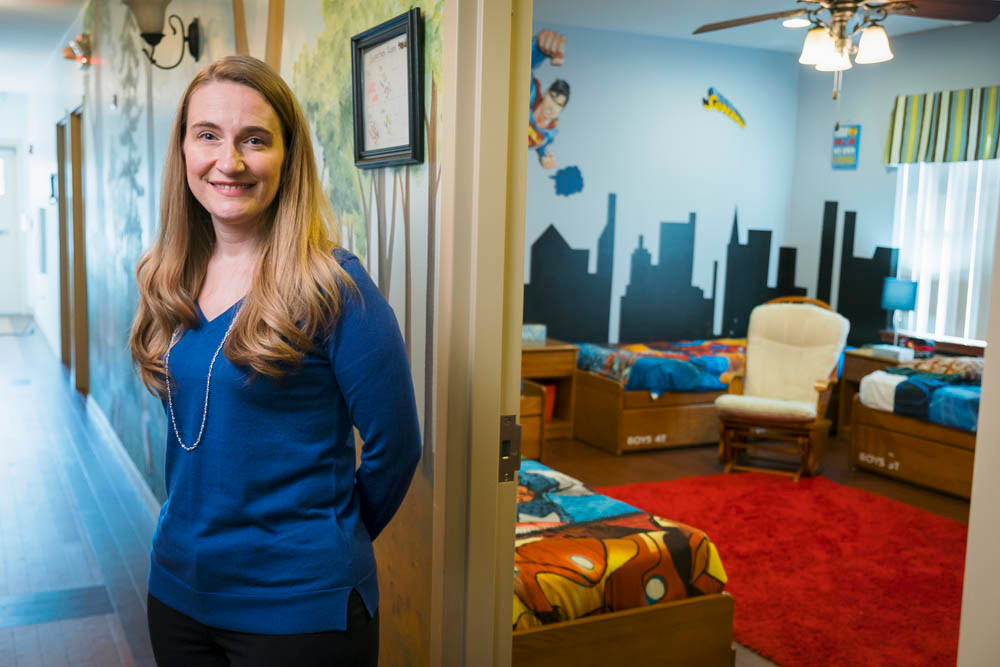YOUR BUSINESS AUTHORITY
Springfield, MO
YOUR BUSINESS AUTHORITY
Springfield, MO

Holly Beadle’s job boils down to preventive maintenance of a most critical kind. As executive director of crisis nursery Isabel’s House, she and her team provide immediate refuge for at-risk children whose families are in crises. Rather than risking becoming the statistical seven in 1,000 children who are abused and neglected in Greene County, according to IsabelsHouse.org, families can bring their children to temporarily live at the home for shelter.
“Our families end up in a much better place when we prevent these things,” Beadle said. “It’s so hard to fix once something has happened.”
The Champion for Children tax credit helps achieve that common mission for Isabel’s House, Court Appointed Special Advocates of Southwest Missouri and The Child Advocacy Center Inc.
However, that credit is scheduled to sunset in 2019. With federal tax reforms rolling out, re-establishing the CFC tax credit is proving more critical than ever, said Jessica Seitz, Missouri KidsFirst’s director of public policy.
Beadle and Seitz testified Jan. 22 before the Missouri House of Representatives advocating for House Bill 2050 – which not only would continue CFC but also increase the credit cap by half a million dollars to $1.5 million.
Give on
CFC is a Missouri benevolent tax credit, meaning they benefit charitable organizations. Such credits represent about 4 percent of the state’s total tax credits, Seitz said.
“They have proven to be very beneficial to local nonprofit organizations,” she said.
CFC splits $1 million of available credits in the Springfield area between CACs, CASAs and crisis nurseries. The Child Advocacy Center, Isabel’s House and CASA of Southwest Missouri receive $333,000 each in tax credits a year.
Seitz said Department of Labor statistics show taxpayers filed to use $600,000 more in credits than the CFC cap in 2017, and $160,000 more in 2016. Considering the increased desire to use the credits, and the subsequent ability for increased donations, Seitz said HB 2050 sponsor Rep. Kevin Austin, R-Springfield, proposed in the bill to raise the cap to $1.5 million, with a sunset date of 2025.
“We asked for that given that it won’t be discussed again for another five or six years,” Seitz said. “We thought $1.5 million would be reasonable to ask.”
House members seem to think it’s reasonable so far, as well.
“The hearing went well, and there were some great questions they asked,” Seitz said. “We’re very pleased that there was a hearing so early in the session.
“We are optimistic that it will go through. We have some strong champions.”
Another silver lining, Seitz said, is that although Gov. Eric Greitens proposed numerous state tax cuts, there was no proposed reform for benevolent credits.
“There has been support from the governor’s office, as well,” she said.
One aspect Seitz said makes CFC appealing to nonprofits and lawmakers is that it’s applicable to smaller donors, with a minimum of $100 donations.
“Our big and small CACs that get donations can benefit,” she said. “It’s not just the bigger pools.”
Beadle said the credit also enables donors to give larger amounts.
“It definitely helps us fundraise to meet our mission – but also having donors who want to give more,” she said.
During fiscal 2017, Isabel’s House received 658 donations of $100 or more that qualified for CFC. According to its annual report, about 58 percent of the nonprofit’s total approximate $1.8 million in revenue came from donations and grants including CFC.
“I can’t stress enough that it allows for us to care for kids and keep them safe and for families to grow stronger together,” Beadle said.
Federal impact
However, those smaller donations could be impacted by federal tax reform.
To receive the federal chartitable tax deductions, deductions must be itemized. However, the reform’s doubling of the standard deduction means more people are expected to not itemize, Seitz said.
The Tax Policy Center, a Washington-based nonpartisan think tank, estimates the change could reduce charitable giving in the United States by $12 billion to $20 billion in 2018.
There is a silver lining, however. CAC Development Director Linda Regan said donors still give because they want to – not just for credits. Some donors contact her with questions about tax credits, but Regan said most often the credits are just a bonus.
“It’s hard to know exactly what is happening at this time,” Regan said of the federal tax reform changes. “It’s all about connecting people with our mission. So when the tax credits come up, it’s just another tool and point and benefit that we can talk about. I think we will always be focused on making sure people know what their dollar does for CAC, and hopefully that won’t be as impacted (by) these changes in the law.”
Where the loss could be, Seitz said, is big companies donating in the thousands of dollars.
CAC Executive Director Linda Saturno said it’s hard to pinpoint the impact – but it does increase the need for tax credits.
“I’m even more anxious to see how much CFC tax credit we’re able to get,” Saturno said. “The importance has gone up in my mind substantially.”
One thing is certain to her: The Queen City is a generous city.
“One of the reasons I came to Springfield was because Springfield prioritizes children,” she said. “The most vulnerable people in our population are children. And when we look at how we allocate resources, we need to prioritize children.”
Connected to Watkins Elementary School is a new storm shelter now under construction.
Updated: Systematic Savings Bank to be acquired in $14M deal
STL construction firm buys KC company
Webster University's deficit triples
‘Dress for your day’: Companies are relaxing dress codes amid evolving ideas about fashion
Missouri House speaker accused of obstruction in ethics probe
Former CoxHealth colleagues starting communications firm
Developer targets opening by month's end for $10M apartment complex